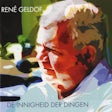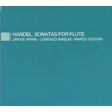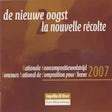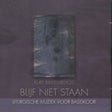Martin Slootmaekers
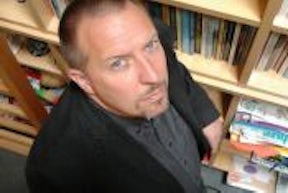
Martin Slootmaekers
Martin Slootmaekers, born in Genk on 27 January 1968, studied Latin and Greek in secondary school and began his musical studies at the municipal music academy in Lanaken, where he earned final diplomas in solfège, harmony and piano. He also received the ‘regeringsmedaille’ for piano. After secondary school, he went on to the Lemmens Institute in Leuven, where he was awarded the ‘laureaatdiploma’ for composition and music education, with first prizes for solfège, harmony, practical harmony, counterpoint and fugue. He also gained a first prize and the ‘meesterdiploma’ in choral conducting under Erik Van Nevel. In 1995 his composition Splinters (for clarinet and piano) was chosen as the compulsory work for the final round for clarinet, saxophone and bassoon at the Gemeentekrediet (a bank) National Competition for Music and Word, now better known as Axion-Classics, an initiative of Dexia Bank. In 1997, the organisers again chose a work by Slootmaekers: (Im)mobile (for oboe and piano) was the compulsory work for oboe and bassoon. In 1998, Martin Slootmaekers submitted his composition Nunc Dimittis (for mixed choir and organ) to the Alphons Diepenbrock Composition Competition in the Netherlands and won fourth prize. In recent years he has received a number of subsidised commissions from Flemish choirs, including Capella di Voce (conducted by Kurt Bikkembergs), Capella Beatae Mariae ad Lacum (conducted by Dieter Staelens), and from the Flemish Choral Federation. His children’s and young people’s cantatas, Web International and Knuffeltijd (Cuddle time), have been performed by several ensembles, each time to great acclaim. Among his other compositions are works for solo instruments, ensembles, songs and choral works, as well as several works for symphony orchestra or concert band. Martin Slootmaekers is mainly active as a choral conductor and composer. Choral music thus takes a central place within his oeuvre. At present, Martin Slootmaekers teaches General Musical Education, Music Theory, and choir and vocal ensemble at several music academies. This has led to the composition of a number of pedagogical compositions, including a complete cycle for General Musical Education (4 parts). In his other compositions, Slootmaekers explores newer techniques such as controlled aleatory music (inspired by Lutoslawski) with self-generated melodies, and the creation of a harmonic spectrum.
Artists and performers
Flanders Arts Institute
Expertise centre for performing arts, music and visual arts.

